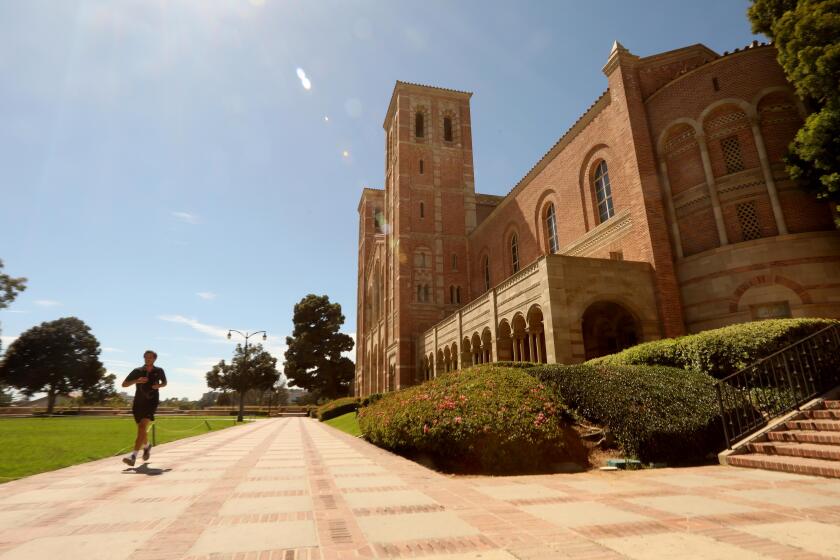Black Bags, Laundering and Reform
SAN FRANCISCO â In the so-called good old days of San Francisco politics, one veteran strategist recalls, âcontributions literally were delivered in black bags. Disclosure requirements didnât have teeth. And we primed the neighborhoods with walkinâ-around money.â
Voters heard a lot of candidate chatter, but often were kept in the dark about who was bankrolling the politicians and who was getting paid off. It was the same in many cities.
Then came Watergate and public revulsion. Californians passed a Political Reform Act that imposed tough disclosure requirements and spending limits on statewide candidates. San Franciscans adopted a similar measure for local races that, in addition, limited the size of contributions. Courts threw out the spending limits but OKd the disclosure requirements and donation limits.
And thatâs where we are today. Several California cities have adopted contribution limits; San Franciscoâs is $500 for the mayoral primary on Tuesday.
Some candidates still raise big bucks--Assemblyman Willie Brown $1.4 million as of Oct. 21 and Mayor Frank Jordan $1.1 million. But it now piles up in small amounts. Not only is the bulging bag of cash illegal, so is the $10,000 check from a downtown developer. A small contractor can be just as influential by giving the $500 max.
Thatâs the theory, anyway. In practice, the developer--or restaurant chain owner or operator of nursing homes--can âbundleâ together the $500 checks of 20 associates or subsidiaries and hand the candidate $10,000. But this requires more work and creativity--and, with the disclosure requirements, a much higher level of honesty than before Watergate.
*
These days, money laundering is the common culprit. That hypothetical developer may want to influence the mayor--soften him up for a zoning change--by salting his reelection campaign with $10,000. But itâs too much trouble to find 19 other people willing to give $500. So he coerces his employees into writing the checks and then reimburses them.
This violates a core tenet of political reform, that voters have a right to know whoâs actually financing--and befriending--a candidate.
âWeâre seeing more and more money laundering at the local level because of contribution limits,â says Ravi Mehta, chairman of the state Fair Political Practices Commission (FPPC).
The FPPC recently nabbed the San Francisco 49ers in a laundering scheme and penalized the football team $60,000. Employees were reimbursed in cash for $7,500 in 1991 donations to then-Mayor Art Agnos. Neither the 49ersâ owners nor the president knew of the laundering, the FPPC stipulated in a settlement; the teamâs financial officer took the rap.
Absurdly, after the 49ers had been caught playing politics illegally, team president Carmen Policy angrily denounced the FPPC for going âpoliticalâ with its discovery. That was unsportsmanlike, he suggested. As if, when a 49er jumps offside, the referee isnât supposed to shout it to the crowd and point the finger.
âAny case as significant as the 49ers has to be used as an example,â Mehta says. âThe message we want to send is that if somebodyâs violating the law, weâre going to prosecute.â
The record fine for laundering was levied two years ago in Los Angeles. Evergreen America, a shipping giant, paid $895,000 in fines after laundering $172,000 to several top politicians.
Mehta wants the Legislature to substantially increase state penalties for campaign violations. He thinks corrupters should lose government contracts and face jail time. Too many launderers now look at fines, he says, âas just the cost of doing business.â
*
San Franciscans Tuesday will decide whether to take the next step in political reform and join Los Angeles and Oakland--neither normally role models here--in adopting voluntary campaign spending limits. Making the limits voluntary wins them court approval.
In Los Angeles, a candidateâs incentive for accepting spending limits is partial public financing. In San Francisco, the incentive would be to keep the $500 contribution limit. Otherwise, it would drop to $150. The spending limit would be $600,000 for the primary and an additional $400,000 for the runoff.
Spending limits force candidates to meet voters more and rely on advertising less. âYou have a dialogue instead of just a pile of mail,â notes attorney Sue Hester, a longtime political activist. âWhen a candidateâs on the street, she canât get away with generalities. Someoneâs going to say, âWait a minute! What did you just say?â â
None of this is perfect. But it beats black bags stuffed with anonymous $100 bills. One reason the publicâs so cynical, in fact, is because those disclosure requirements allow it to peek inside the system. Even so, in a democracy, itâs better to be cynical than ignorant.
More to Read
Sign up for Essential California
The most important California stories and recommendations in your inbox every morning.
You may occasionally receive promotional content from the Los Angeles Times.











